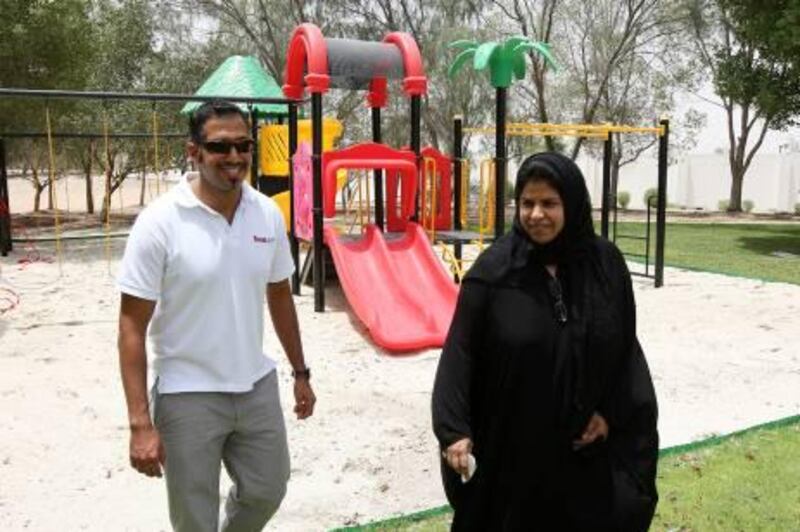DUBAI // The reds, blues and yellows of the swings, slides and monkey bars in the new playground stand out brightly against the sandpit and the bordering grass.
Nestled beneath a cluster of trees providing a respite from the sun, the play area has become a garden for residents of the Dubai Foundation for Women and Children (DFWC).
MORE UAE NEWS: Our pick of today's top local news stories
Facebook Ramadan insult earns Briton Dh3,000 fine Woman called her female colleague a dictator and a bin Laden follower, a Dubai court has been told. Read article
Doctor suspended in Dubai on murder charge has job in Al Ain Intensive-care chief on trial for murder is working in hospital. Read article
Dubai Police investigate possible hacking of their tweets Police investigate possibility that someone within the force, or a former employee, is making unauthorised and malicious use of their account. Read article
[ MORE UAE NEWS ]
The DFWC yesterday said the playground, behind two villas where neglected and abused children are given shelter, had been donated by Swing City, a company that provides and installs playground equipment.
The donation, valued at about Dh30,000, was crucial in helping the children to heal and develop through play, said Dr Mona Al Bahar, the deputy chief executive for care and community services at DFWC.
"Playing is part of a child's emotional, physical and mental growth, and we adopt a holistic approach by ensuring that play is part of a child's therapy," Dr Al Bahar said.
"Installing this playground for the younger children is a first step in the right direction, in providing these kids with a playful, fun environment where they can heal and learn to be carefree."
The space will provide the children with a recreational area where they can develop socially and cognitively, said Mohammed Yacoob, the operational manager at Swing City.
"It's a fun and safe environment for them to have some downtime and just be kids," Mr Yacoob said. "It is up to standard and safe enough for the kids to enjoy and make the most out of.
"Hopefully, it will drive more companies to get involved in social responsibility and find ways they can give back to the community."
The DFWC is a shelter for women and children who are victims of domestic violence, child abuse, trafficking, neglect and broken homes. It can fit 170 people but the numbers vary.
"Right now, we have three children staying with us: a 1-year-old baby, a 5-year-old and a 12-year-old," Dr Al Bahar said.
And regardless of their ages, she said, all children need to play.
"Even as adults, we rely on a form of play or entertainment to relieve stress," Dr Al Bahar said. "Babies as young as a few months old benefit from basic exercises to their limbs, and their mothers are taught to do that to ease a baby's tension.
"There is no question how important playing is to a child."
Dr Azhar Abu Ali, the director of care and rehabilitation services at DFWC, said children learnt how to express themselves and form an identity through play.
"We gear our play therapy programmes to each child depending on their age, mental capacity, intellectual capacity and type of trauma," Dr Abu Ali said.
"We have all sorts of toys for them to play with - whether doll houses or utensils or clay or colours to draw with - and with the swing set outside they can now head out with their therapists and experience a new sort of play."
The children will learn to trust again, share and contribute as part of a team, take turns and take care of themselves in different environments when the type and venue of play is varied, said Dr Abu Ali.
"Playing lets children recognise emotions, develop language and communication skills, develop attachments to other adults - all the things they could not do because of the abuse they lived through," she said.
The mothers at the shelter will be encouraged to take their children to the playground and watch them play, which will form a stronger bond between them and teach the child to trust the mother.
"There are endless benefits to getting a child to play, from allowing them to let off steam and express themselves to teaching them," Dr Al Bahar said.
Most importantly, said Roudha Al Bahri, the activities co-ordinator at DFWC, the playground allowed children to have a normal childhood and experience what every child gets to experience.
"We take them out on field trips and to play areas in the mall because that's what kids do - they get taken to fun places and told to play," Ms Al Bahri said.
"It's very important for them to have a normal life and recognise that they are part of society."






